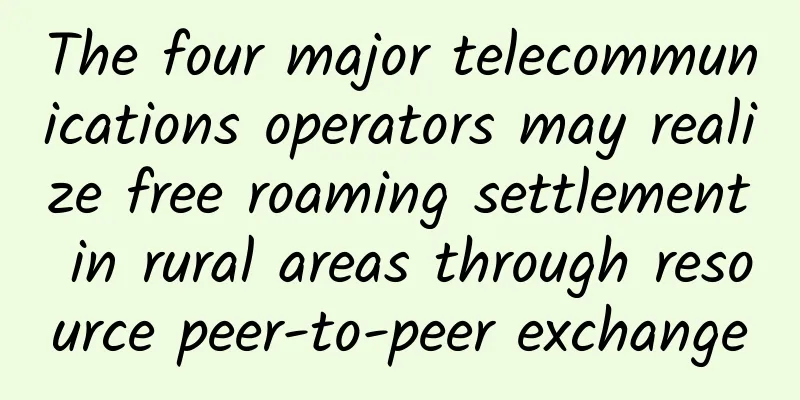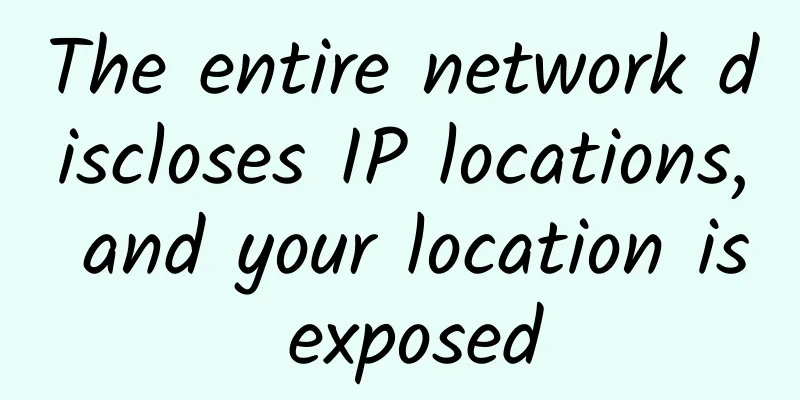The four major telecommunications operators may realize free roaming settlement in rural areas through resource peer-to-peer exchange

|
In response to the question of how the four major telecom operators will settle roaming charges in the future, I can firmly and responsibly tell you that the four operators' mutual opening and sharing of roaming services is a practical action to thoroughly implement the people-centered service concept, do practical things for the people, and serve the people.
Under the guidance of the five development concepts of openness and sharing, and driven by major technological revolutions such as cloud-network integration and cloud computing, blockchain and network slicing, the time is ripe for the four operators to open up, share and interconnect with each other, and implement peer-to-peer exchange of network resources. This is also an inevitable trend of cloud-network integration. The mutual peer-to-peer exchange of the four major operators' Internet settlements can basically realize free roaming among the four operators. For example, in the past few years, China Telecom in the south and China Unicom in the north have already provided China Mobile with free wired broadband network settlement fees, which has caused China Telecom and China Unicom to lose tens of billions of yuan in wired broadband network settlement fees every year. Now it is China Mobile's turn to open up mobile Internet roaming fees to China Telecom and China Unicom for free. This is the inevitable result of the equal exchange of network resources among the four companies and free roaming fees for each other under the background of cloud network integration and three-network integration. The four parties exchange resources on a reciprocal basis, interconnect with each other and cooperate for mutual benefit. There is no question of who gets something for free. Instead, through market-oriented mechanisms, they flexibly use the reciprocal exchange of network resources, and ultimately achieve a new pattern of innovative development of intensive public infrastructure with complementary advantages, synergy, mutual benefit, shared competition and cooperation. In addition, will the implementation of roaming among the four major telecom operators in county-level and lower administrative areas lead to a lack of enthusiasm and motivation for some operators to build networks? If the four carriers' roaming on different networks happened in a capitalist market economy country, it might lead to insufficient motivation for operators to build networks. However, China is a socialist market economy, and the telecommunications central enterprises in the socialist market economy are very different from the capitalist privatized market economy of the United States. In the future, the construction of 5G networks will be planned and directed by the state. For example, the state can plan and direct China Mobile to build 700M low-frequency 5G base stations in rural areas. Whether you like it or not, this is what the socialist market economy must do. China's socialist market economy is very different from the American capitalist market economy, understand?! |
<<: WiFi 7 will have these improvements with a speed 2.4 times faster than WiFi 6
>>: API Gateway Selection: I use OpenResty!
Recommend
The impact of drone technology and use cases
Before we dive into the ways drones can make the ...
Wi-Fi7 is here, should the access method of smart home appliances be unified?
In recent years, Wi-Fi specifications have been i...
Software-defined data centers face constant challenges: IT departments need to shift their focus
Virtualization has revolutionized the data center...
Learn Network TCP/IP Protocol Stack
[[409633]] This article is reprinted from the WeC...
RAKsmart: Asian servers starting from $59/month, 50M bandwidth, available in Korea/Japan/Hong Kong/Taiwan/Singapore data centers
RAKsmart provides independent servers and cloud s...
Hostwinds: VPS monthly payment starts at $4.99, cloud server starts at $0.006931/hour, free IP change
Hostwinds is a long-established foreign merchant ...
VMware Unveils Innovations to Help Telecom Operators Modernize Their Networks
In today's digital economy era, it has become...
80VPS: Korean CN2 server starting from 350 yuan/month, 2*E5-2450L/8GB/1TB/10M bandwidth/quick launch
80VPS is a Chinese hosting company that was estab...
JuHost: Hong Kong VPS limited 40% off starting from $2.99/month, 1G memory, 20G SSD, 1TB monthly traffic
Last month, I shared information about JuHost, a ...
WOT Huang Shuquan: Edge computing helps industrial intelligent manufacturing
[51CTO.com original article] On May 18-19, 2018, ...
A thorough understanding of container network communication
Author | Chen Yunhao (Huanhe) 1. Background 1. Wh...
Tencent Cloud New Year Special Offer: 2C2G4M Cloud Server 30 Yuan/3 Months or 108 Yuan/Year
From February 15th to February 28th, Tencent Clou...
JD Interview: What are the differences between Cookie, Session and Token?
As one of the three giants of traditional e-comme...
When WiFi6 collides with 5G, is it a crisis or a business opportunity?
September 16, 2019 WiFi Alliance announces WiFi6 ...
[6.18] DediPath: $30/month-E3-1240v2, 16GB memory, 2TB hard disk, 1Gbps unlimited traffic/Los Angeles data center
DediPath launched a Father's Day Sale. Becaus...









